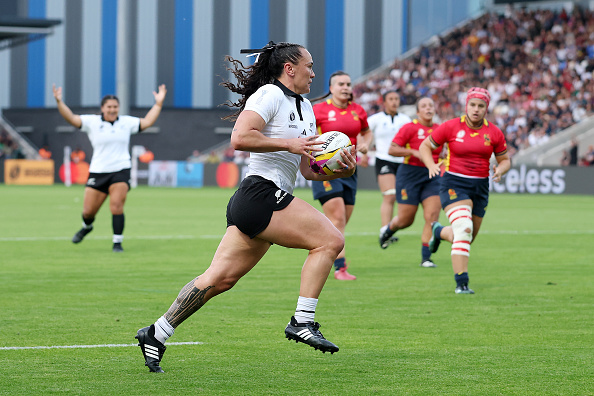Do rugby players use weed?

If you’re from the U.S., you may not have heard of rugby before last summer’s Paris Olympics. The U.S. Women’s team shocked the world by winning a bronze medal as a major underdog—the team reached social media prevalence at the hands of Ilona Maher, one of the team’s best players (who soon after appeared on Dancing with the Stars). The Women’s Rugby World Cup started on the 22nd, and with so many new eyes on the sport, the event is bound to be an exciting time.
Rugby is a high-contact sport that demands a lot of its players’ bodies. From brutal tackles to about 7000 meters to cover in area, rugby players are some of the fittest—and most beat-up—athletes on the planet. With that being said, many players are bound to self-medicate through many methods. Is weed a viable option?
RELATED: Will cannabis help you work out?
World Rugby’s view on weed
When it comes to cannabis in rugby, the answer gets complicated, especially because of the international nature of the competition. First and foremost, any given athlete is bound to their country’s laws, so that eliminates a large number of rugby players from using weed—at least, doing so openly. For players that come from places where consumption is legal, however, the final say is World Rugby’s. According to the association’s handbook, cannabinoids are prohibited in competition but allowed outside of it.
While this stipulation may seem to imply that the plant has performance-enhancing qualities, resources like the Anti-Doping Database say the ban is more about the effect of players’ mental and physical capabilities during gameplay, which could lead to serious injuries if impaired.
Many rugby players still use weed
Despite the rules in place, many rugby players do, in fact, use cannabis regularly. In a 2020 study published in the International Journal of Sport Nutrition and Exercise Metabolism, researchers found that cannabidiol, or CBD, was often used by male professional rugby players—this includes those who play rugby union and rugby league.
Of the respondents to the survey sent out for the study, 91 percent reported being aware of CBD, and 26 percent of those respondents reported having used it at one point (eight percent said they used it currently, and the remaining 18 percent had simply used it before). The findings suggested that rugby union players were more likely to use the substance, but they found no difference in usage between the two position groups, backs and forwards.
Of those who had never used CBD, 64 percent cited the reason as being concerned about anti-doping violations.
CBD is the only cannabinoid allowed under the World Anti-Doping Agency, so these athletes should be safe in theory—because of the nature of how weed is cultivated, though, it’s nearly impossible to rid CBD of all traces of THC, its intoxicating counterpart. This poses a risk that some athletes may not see as worthwhile: why use CBD if there’s a chance it could result in disciplinary actions?
Finn Russell, one of Europe’s best rugby players, is an advocate for using CBD—the fly-half takes an oil version of the cannabinoid to sleep better at night, and sometimes uses it after waking up in the days following a game.
“It’ll be different for everyone,” Russell told BBC Scotland. “It doesn’t kill the pain there and then, but it allows me to get a good night’s sleep so the next day I’m feeling a lot better.”
Former New Zealand player Jermone Kaino, who won the Champions Cup at the age of 38, uses the substance for anti-inflammatory purposes, saying that it prolonged his career: “The last few years I’ve had a few operations and niggling injuries in the knees, elbows, and shoulders. CBD has 100 percent had a huge impact and input in being able to maintain my level of playing the last couple years.”
Two former players, Dominic Day and George Kruis, teamed up to create fourfive, a sports supplement company that sells products containing CBD, lion’s mane mushrooms, and other unorthodox ingredients, which the pair claims will benefit athletes in their pursuit of greatness.
RELATED: Athletes share their journeys with psychedelics
What’s cannabis’s place in rugby?
Because of rugby’s international and etiquette-based traditions, it’s unlikely we’ll see a heavy weed culture in the sport like we do in American sports. Still, as the landscape shifts to include social media stars like Maher and the sport garners interest by a new demographic, anything can happen.